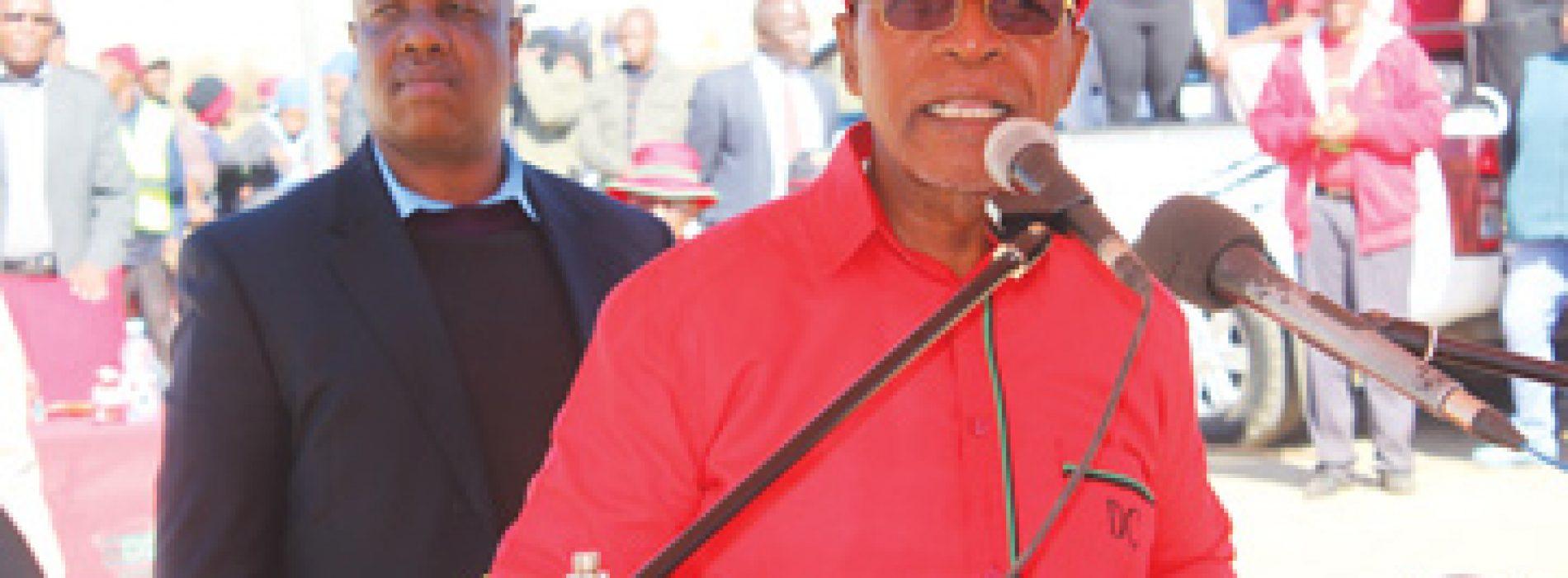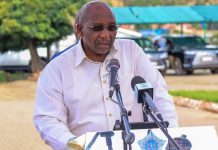Africa-Press – Lesotho. Election-related conflict has not completely gone away but has continued in a different form. It is no longer about the exclusion of one party by another, as was the case under the FPTP electoral system.
It is now about the exclusion of individuals by their parties. The party list system has brought with it increased competitiveness during intra-party candidate nominations.
Consequently, candidate nomination processes including primary elections across parties has become more complex. A plausible case can be made that, the increase in intra-party conflict is the unintended consequence of the MMP system.
In their search for the social and economic dividends, which come with being in parliament as well as in the cabinet, members of parties have increased their demands on party central committees to be more open and transparent in the management of the candidate nomination processes and procedures.
This has often led to confrontation between the party leaders and their structures, resulting in factionalism and splits. A common trend since the country’s return to multiparty democracy in 1993 has been that the ruling parties (BCP, LCD and ABC) are the ones which have suffered the most splits ahead of the elections, despite having triumphed in the previous elections as shown in Table 2.
What is peculiar to Lesotho political parties is that they are almost all led by leaders who have recycled themselves to remain at the top of the food chain.
I prefer to categorise these leaders as “political re-treads” because they do not offer quality leadership and are incapable of lasting the distance on the journey of political ideas and transformative politics.
Members of Parliament and other senior party leaders who face competition in their constituencies, or feel that they are being pushed to the periphery by the party leaders, have been seen defecting to other parties with the same goal in mind, access to wealth.
This paper refers to this group of politicians as “Party hoppers”. The BCP has produced the most party hoppers, and it has never recovered from its first split of 1997. It was toppled in parliament by its own leader, Prime Minister Ntsu Mokhehle.
Under pressure from a dominant group within the party’s Executive Committee (known then as the Pressure Group) to relinquish power Mokhehle formed the LCD and immediately claimed that he was still Prime Minister because he had a largest (41) number of MPs who crossed the floor with him, compared to the BCP’s 21 MPs.
As evidence of its support, the LCD won all but one of the 80 constituencies on offer. Following the death of Ntsu Mokhehle, in January, 1999, jostling for the control of the party and strategic positions ensued, and, in no time, the centre could no longer hold in the LCD.
Factionalism, which had never really ended, reared its ugly head between the two factions led by Mokhehle’s successor, Prime Minister Pakalitha Mosisili, and his Deputy Kelebone Maope.
A cabinet reshuffle by Mosisili saw the younger brother of Mokhehle, Shakhane Mokhehle, being dropped from the LCD Cabinet and subsequently quitting the LCD with 25 other MPs to form the LPC with Kelebone Maope.
Divisions within the ruling LCD continued even after the 2001 split and notwithstanding the adoption of the MMP electoral system which, it was hoped, would bring about stability.
In 2006, the Minister of Science and Technology, Thomas Thabane resigned to form the ABC taking with him 18 MPs. The ABC’s support base was mainly in the urban areas, including the capital city of Maseru.
It won 17 out of the 80 constituencies in its first election contest in 2007. Its support consolidated in 2012 elections where it won 26 constituency seats and obtained 4 compensatory PR seats.
It also gained more seats in the 2015 elections where it won 40 out of the 80 constituency seats and obtained 6 compensatory PR seats. In the 2015 elections, the ABC became the largest party in terms of constituency support eclipsing its mother party, the LCD.
Just like Ntsu Mokhehle, who formed the LCD in 1997 after the challenges directed at his leadership by the members of the National Executive Committee, Pakalitha Mosisili, who was one of the engineers of the BCP split in 1997, also faced serious challenges from the Executive Committee, in 2012.
This resulted in him and 43 other MPs leaving the LCD and forming the DC. The DC went on to win the largest number of constituencies in the 2012 elections, making it the biggest party in terms of constituency support.
It won 41 out of the 80 constituencies and was compensated with 7 PR seats. It was poised to form the government, had it not been for the coalescing of the opposition parties led by the ABC.
Although the DC regained power in 2015 through a coalition with smaller parties, it recently experienced factionalism, which led to yet another split. The faction that was led by the DC Deputy leader, Monyane Moleleki, has since formed a new political party, the Alliance of Democrats (AD).
From Party-hopping to Coalition-hopping:
“A luta continua, vitória é certa”
Besides party-hopping by individuals as already described, there is another type of hopping namely from one coalition to the other.
Under similar motives which have given birth to party hopping, coalition-hopping is ‘the new game in town’ since the advent of coalition politics in Lesotho. When the objectives cannot be achieved within one coalition, then coalition-hoppers move on to the next one.
For instance, in a twist of ironies, the LCD and the DC which were sworn enemies following the DC’s usurpation of power from the LCD in an ugly split in 2012, joined forces together and engineered the fall of the ABC led coalition government.
The LCD’s decision to partner with the DC cost it dearly as some of its MPs split to form a new party, the Reformed Congress of Lesotho (RCL), in 2014, in protest.
Besides the LCD having hopped from a coalition government led by the ABC to the one led by DC, smaller parties have also devised a way to hunt with the hunters and run with the hares.
In the previous coalition government, the Popular Front for Democracy (PFD), BCP, Basotho-Batho Democratic Party (BBDP), Lesotho People’s Party (LPC), Basotho Democratic National Party (BDNP), National Independence Party (NIP) and Marematlou Freedom Party (MFP) formed a loose alliance, called the bloc.
The bloc decided to support the ABC led coalition government from the outside by only voting with it in parliament against the DC which had been isolated as a punishment for its power grab in 2012, after splitting from the LCD.
When the ABC-led coalition government collapsed, five of these parties hopped to the new coalition government after they each secured one PR seat in parliament.
However, they opted to be part of the cabinet, this time, and share the spoils in the allocation of Senatorial, Ambassadorial and other senior government positions under the Khokanyan’a Phiri coalition government, as the coalition refers to itself.
One consequence of the MMP system is that because it compensates smaller parties which without it would be wiped off the political landscape, it virtually makes these parties win elections by losing them.
Small parties—such as the ones which initially formed the bloc, and now form part of the Khokanyan’a Phiri coalition—have been turned into king-makers in Lesotho politics, despite the fact that they enjoy very little popular support.
They make, or break, coalitions, as we saw in the ABC-led coalition and, now, with the DC-led one. The foregoing sections show not only the fluidity of political parties in Lesotho but also how lightly politicians regard the needs and aspirations of the people.
As indicated earlier, none of the splits was a result of politicians battling over ideas on how to develop the country. The 2015 election campaigns which are, in actual fact, mere politicking events for the parties devoid of clear development goals, are a case in point.
Ruling and Opposition parties in Concert to Plunder State Resources
Lesotho provides public funds to political parties for campaigning purposes. The campaign funding is provided to parliamentary and non-parliamentary parties alike, albeit on set distribution criteria.
Proportionality to the number of votes obtained in previous elections is used for parliamentary parties while equal distribution is used for non-parliamentary parties.
A limitation of the party funding law is that its disclosure requirement does not go beyond election time. This means that parties and individuals can amass illicit funds during the period in-between elections.
The legal provision of party and campaign finance is one of the important aspects for which Lesotho has to be given credit. However, the campaign component of the provision has proven to be problematic.
Firstly, it is an incentive for proliferation of parties because party hoppers know that when they break away from their parties, they will have some funds (no matter how meagre) from the state towards the campaign activities of their new parties.
This is different from South Africa, for instance, where parties have to prove their worth through the ballot box first before they can access the public funds.
It has also been one of the sources of intra-party conflicts because although the law requires parties to account for the funds, adherence to this requirement by both the ruling and opposition parties is very low.
The abuse of funds by party leaders coupled with the lack of financial accountability within these parties has often triggered tensions. Both ruling and opposition parties’ leaders have been accused of misuse of state resources for personal gain.
In a clear political motive, the DC led coalition used public funds to pay off M500 000 personal loans of all MPs of the 8th Parliament. These MPs claimed that they did not foresee that the 8th Parliament would not last its full term and therefore this meant that they were no longer going to be earning an income to repay the loans.
Opposition MPs never raised an objection to the government’s placing the burden of loan repayments on the tax payers. They, instead, feigned innocence claiming that they have not asked for their loans to be written off.
Many of these MPs were re-elected back to parliament after the February, 2015, elections and as things stand, they are now entitled to take new loans as members of the 9th Parliament.
In another case of the plunder of state resources, in 2006 the Executive took the decision to allow its members and other senior officials holding statutory positions to buy government vehicles under the Government of Lesotho Vehicle Scheme (Shale 2008:182).
The government sold three-year-old luxury vehicles for only 1 percent of their original value to the Executive and senior officials. Ministers bought C-Class Mercedes-Benzes for as little as M3 000.
Holders of statutory positions bought Toyota luxury cars for M1 700. Although, to their credit, opposition MPs voted against this move in parliament at the time, under the politics of poverty, Parliament is very weak while the Executive is too strong.
This fact is also noted in the 2010 APRM Country Report which states that the institutions that are supposed to exercise public financial accountability are dysfunctional. It adds that:
Accountability in the use of public fiancé, auditing, and reporting is grossly inadequate.
In addition, although parliament officially allocates budgets and authorises expenditures, it is unable to oversee the expenditure of the executive and other arms of government (p. 231).
Members of Parliament are basically torn between competing principals, the party, on the one hand, and Parliament, on the other. The Executive in Lesotho has prevailed not once but many times over Parliament because of the patron-client relationship.
The latter is made up of people who owe their political existence to the former. Therefore, decisions by the executive to dish out patronage using state resources, without accounting to anyone, is a classical case in point.
In fact, one of the major problems facing Lesotho is too much concentration of power in the Prime Minister. Reflecting on the same problem in Britain, Graham Allen MP from Nottingham North, states that in the Westminster system:
.
.
. the prime ministership over many decades has evolved into an accidental presidency. The result is a dysfunctional democracy, in which power is over-concentrated, over-centralized and under-controlled. Our democracy is out of balance and dangerously short on popular consent and participation . . .
The Constitution of Lesotho clearly gives a lot of power to the Prime Minister, including the power to take any action without the consent of the King—which action will be deemed to have been taken by the King himself.
Admittedly, the Constitution also provides for the removal of the Prime Minister, through a motion of vote-of-no-confidence. But in a system where the Prime Minister is the most influential political figure over any given legislator, it is not easy for this to happen.
The over-concentration of power in the Prime Minister has definitely proven poisonous for Lesotho over the 50 years because the political elite have been engaged in a cut-throat contest to have such power.
They have not been shy to use it albeit not for the benefit of the country. The current Prime Minister, Mosisili, has now been in power for 17 years, just 4 years shy of Leabua Jonathan’s record of 21 years.
Excessive power, combined with overstay in political office, have proven to be costly to Lesotho, as has been witnessed during the Leabua Jonathan (1965-1986) and now Pakalitha Mosisili (1999-date) eras.
Effect of Internal Functioning of Partieson Political Stability
Although regular multi-party elections have become a norm in Lesotho, the dearth of a normative framework for the internal functioning of parties has led to lack of intra-party democracy resulting in weak political parties.
As Veen (2007:12-13) reminds us, preponderance of weaker parties leads to a weaker party system. Conversely, a strong party system is an outcome of high quality, stable and proper functioning political parties.
Such quality is determined by a number of factors, including, but not limited to, the make-up of the parties; the strength of their internal cohesion and programmatic profile; the structure and efficiency of the organisation; the identification by all members with the party; their democratic structure from bottom to top, and from local to state level; and, their internal and external (the media and the public) communication skills.
Political parties in Lesotho are nowhere near this quality hence the political instability which has characterised the country since independence. In conformity with Motlosa’s notion of “triple tragedy” of autocratic bureaucracy, oligarchic personality cult, and pork barrel politics, both the ruling and opposition party leaders are averse to intra-party democracy, including leadership alternation.
If they cannot hold on to power in their parties, they jump ship and form new parties. The following three incidents demonstrate further how the parties’ failure to master proper internal functioning has plunged the country into a political morass.
Firstly, the BNP split from the BCP in 1959 and its subsequent capture of power in 1970 led to serious tensions which have sadly defined the trajectory of inter-party relations for the past 50 years.
It is important to underscore that right from the beginning at independence, the governing party violently dealt with the opposition thus establishing the aggressor-defender syndrome in Lesotho’s inter-party relations.
Makoa (2011:50) reminds us that, the armed forces remained loyal to the BNP even during the early years of the BCP rule after restoration of democracy, in 1993.
He cites a number of peace-threatening episodes, during that period such as the Lesotho Defence Force (LDF) in-fighting in 1994 and the subsequent murder of the Deputy Prime Minister Selometsi Baholo by LDF.
Secondly, when the LCD split from the BCP in 1997, the country saw unprecedented protests which reached the climax after the LCD won the 1998 elections.
Convinced that the LCD had usurped power from the BCP illegally, the BCP and other opposition parties violently protested against the LCD victory and in no time the country was on the brink of a civil war had it not been for the SADC military intervention.
Thirdly, the 2006 ABC split shook the country’s stability yet again. The electoral gains by the newly formed ABC in the 2007 elections threatened the LCD, which in typical fashion of African ruling parties, unleashed the security agencies on the ABC and other opposition parties.
Curfews, enforced by the LDF, became the order of the day and democratic space for citizen participation was constricted and infringement on human rights became common in post 2007, as was the case after the aborted 1970 elections. Thirdly, the advent of coalition politics has ushered in a myriad of challenges which have created political instability.
As political elites compete for state power through coalitions, Lesotho has witnessed inter-party relations deteriorating to the lowest ebb; and relations between the security agencies, especially the army and the police, being defined along partisan lines and the respect of the rule of law being eroded at an alarming rate, thereby destabilising the political system.
Throughout Lesotho’s 50-year unstable political history, the youth and women have been on the receiving end, both in terms of political violence as well as lack of opportunities for employment, access to health and education.
Both the youth and women have been manipulated by the political elite for selfish interests and they are made to toe the party line with the false or real hope that the party leaders will remember them once they capture power.
Sadly and despite promises by parties since independence, the women are still side-lined just as they were under colonialism (Scully 2009:29). This situation leads to the emergence of inequalities in society and, in most cases, women are the most affected.
The APRM Report (2010:32) notes that despite an attempt by the Lesotho Government to improve on the position of women by revising the laws and developing policies geared towards addressing gender equality, things remain the same largely because of patriarchal cultural practices which government is incapable of dealing with.
The continent’s return to multi-party political dispensation in the late 1980s and early 1990s came with a renewed promise that political parties would carry out democratic reforms which had hitherto been suppressed by single party regimes.
However, it has now come to pass that instead of becoming the harbinger of democratic ideals and pushing the envelope in search for the solutions to the challenges that face women and young people, political leaders in Africa, including in Lesotho, have not genuinely taken measures to empower men and women.
Without contradicting myself, it is important to state that Lesotho has in recent years has been praised for the inclusion of women in Parliament, cabinet and local councils.
Yet, a closer look at the number of women who get into parliament through the FPTP is very low compared to those who come through a PR list. At the local level, Lesotho has been rated higher in terms of women inclusion after it attained a 30 percent threshold on inclusion of women.
In 2005, it had reserved one out of three polling divisions throughout the country for females, translating into 385 out of the 1272 electoral divisions (Shale 2005:11).
Political parties have, without fail, established women and youth leagues in their parties over the years but the lack of appropriate format for women and youth empowerment at all levels by the parties has only led to token inclusion in some decision making structures.
Young people, glorified as youth leaders from across different political parties, engage on radio stations in Lesotho, spewing political cacophony and character assassinating leaders of other parties instead of focussing on issues which affect young people and policies which they would like to see enacted for the empowerment of the youth.
Conclusions
This chapter has demonstrated that political parties in Lesotho have indubitably contributed to the country’s instability through their intra and inter party conflict and it makes the following conclusions.
Firstly, that one of the major problems facing Lesotho is a lack of quality political leadership. It invokes the notion of recycled leaders to illustrate this Achilles heel.
The chapter takes the diagnosis of the problem beyond the issue of personality cult politics and argues that, actually, the Lesotho problem has to be called what it is: politics of poverty.
The litany of party splits is a result of the politics of poverty as the political elites search for greener pastures, thereby causing a serious harm to the country more than they would care to admit.
Secondly, it is concluded that the advent of coalition politics has transformed the bi-polar conflict setting, between parties to a multi-polar and multi-layered conflict within individual parties and between coalition partners.
As a result of the elitist, opportunistic andavaricious tendencies, there are no sufficient mechanisms being put in place to deal with this type of conflict and to ensure normalisation of the party and political systems.
Thirdly, the chapter bemoans the fact that there is no meaningful empowerment of youth and women. It observes that the political elites’ agenda has simply been one of exploitation of the vulnerabilities of young people and women, ‘finish and klaar’ (period).
The country can never be prosperous when the majority of its population, women and youth, experience violence and strategic political repression at the hands of political leaders.
Fourthly, and finally, it can safely be argued that Lesotho and Basotho have little to celebrate for the country’s attainment of a Golden Jubilee because the socio-economic challenges which faced the country 50 years ago continue unabated. The political elite have only succeeded to divide the people instead of binding them together and creating jobs and decent living conditions.






